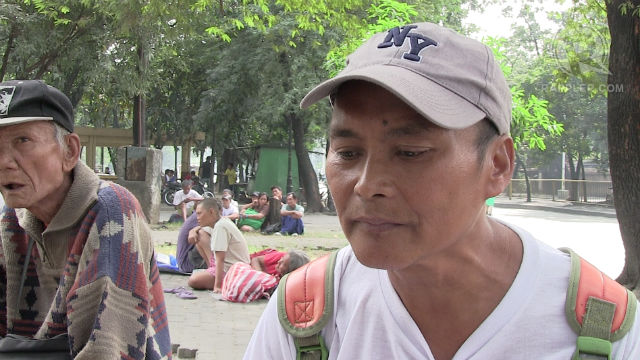SUMMARY
This is AI generated summarization, which may have errors. For context, always refer to the full article.

MANILA, Philippines – They’re hailed as heroes propping up the Philippine economy. But some overseas Filipino workers don’t always come home with a success story.
David Lozada reports.
EUGENE ASIO, FORMER OVERSEAS WORKER: Itong mga agency na ito kapag nasa labas kami ang tawag sa amin bagong bayani kasi 100% remittance tumatakbo dito sa Pilipinas. Noong wala na kami, wala na rin silang paki-alam. (These agencies call us heroes when we’re abroad because 100% of our remittance goes to the Philippines. Now that we’re no longer useful, they don’t care about us anymore.)
Heroes don’t always succeed.
Eugene Asio is a former OFW who worked in factories in the Middle East and Africa. Nowadays, he collects bottles in the streets and goes to soup kitchens to survive.
EUGENE ASIO, FORMER OVERSEAS WORKER: Napunta lang ako rito dahil sa hiring ng trabaho. Kaso hindi naman ako natuloy kaya naubusan na rin ako ng pera. Dito na rin ako ngayon sumasama sa feeding. Sa gabi doon ako natutulog sa bay walk. Gabi gabi yun. Kapag umulan, hahanap ako ng building sa tagiliran. Makatulog lang. Kapag araw na hanap na ulit ng feeding. (I came here to Manila to fix my job hiring requirements. It didn’t push through and I had lost all my money. That’s why I join these feeding programs. I sleep every night in baywalk. When it’s raining, I look for buildings nearby. At day, I look for feeding programs again.)
There are many like Eugene walking the streets of Manila.
Former OFWs like Eugene go here in Liwasang Bonifacio every morning to get their breakfast from different charity groups. They go to other feeding programs in Manila to get their lunch and dinner.
Arthur Villeta waits for free food from benefactors. He was a fashion designer of the Brunei royal family for 9 years until a stroke ended his career. He got accepted in other jobs abroad but he couldn’t pass the medical exams.
He says he has not received any support.
ARTHUR VILLETA, FORMER OVERSEAS WORKER: Yung sabi nila kapag OFW ka, priority ka ng gobyerno. Sabihin mo daw lahat. Pero hindi naman nangyayari yun sir. Kung priority ka, dapat paglapit mo unahin ka. Kapag nakita yung case mo dapat unahin ka. Pero wala eh. (They say OFWs are prioritized by the government. You just need to tell them your problems. That’s not true. If we’re really important to them, they should give us support. They should immediately act on our cases. But that’s not what happens.)
Like Arthur, Eugene says he has lost faith in government.
EUGENE ASIO, FORMER OVERSEAS WORKER: Hindi naman ako puwedeng lumapit sa OWWA. Hindi naman ako puwedeng humingi doon ng financial support kasi alam mo naman yung patakaran nila. Magbibigay lang sila kung ika’y papaalis na…Ang kaso nga, kailangan ko ng pera para sa pag-aapply tulad ng pagpapa-xerox, pagfa-followup. Hindi ako maka-apply ngayon. (I couldn’t ask help from OWWA. They only give financial support when you’re already leaving. My problem is, I don’t have money to apply and even to photocopy documents. I need money to do follow up on my applications. I’m stuck now.)
Despite the government’s goal to reduce the number of Filipinos leaving,a report in June says, the number of OFWs increased steadily through the decades.
The Overseas Workers Welfare Administration has reintegration programs available for repatriated OFWs. Neither Eugene or Arthur benefited from these. Both men hope they can still go abroad. They see it as the only solution to their hardships.
EUGENE ASIO, FORMER OVERSEAS WORKER: Umaasa na lang ako na baka sakaling may makatulong. Sa skills ko, kailangang kailangan yung skill ko sa mga planta, makakabalik ako sa abroad. Pero yung uuwi ako, hindi ako uuwi hanggang hindi ako nakaka-abroad. (I’m still hoping that someone will help me. I know that my skills are needed abroad. I won’t go back to Davao until I’ve gone abroad again.)
David Lozada, Rappler, Manila. – Rappler.com
Add a comment
How does this make you feel?
There are no comments yet. Add your comment to start the conversation.